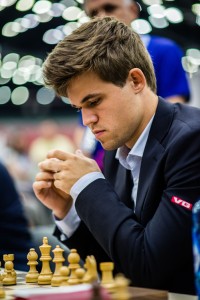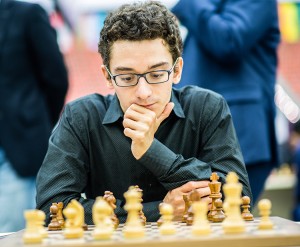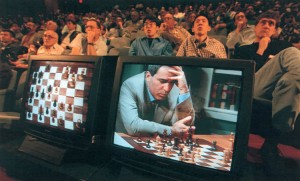Carlsen’s Checkmate
November 30, 2018
Two days ago on November 28, Norwegian chess grandmaster Magnus Carlsen defeated American challenger Fabiano Caruano to successfully defend his title as chess world champion. This year’s World Chess Championship took place at the College in Holborn, a district of London, England. Carlsen’s birthday is today, November 30: he is 28 years old.

Norway’s Magnus Carlsen successfully defended his World Chess Championship title in November 2018. Credit: Andreas Kontokanis (licensed under CC BY-SA 2.0)
The Fédération Internationale des Échecs (FIDE), also called the World Chess Federation, organizes the annual World Chess Championship. Some famous champions from the past include Bobby Fischer, an American player who disrupted Soviet Russian dominance of the game in the 1970′s; Garry Kasparov, a powerful Russian champion who famously lost to the computer Deep Blue in 1997; and Viswanathan Anand, the first Indian world champion, who lost the title to Carlsen in 2013.

Fabiano Caruana fell just short of becoming the first American world chess champion since Bobby Fischer won the title in 1972. Credit: Andreas Kontokanis (licensed under CC BY-SA 2.0)
In high-level chess, players are so skilled and well-prepared that they are often unable to gain a major advantage over each other during a game. Therefore, ties—called draws—are common. Also, at such a high level, the player who has the white pieces can take advantage of having the first move (white always moves first). Therefore, wins with white are somewhat more common than wins with black.
The 2018 championship match between Carlsen and Caruano started with 12 games in which each player had several hours to complete his moves. Magnus, the world champion since 2013, and Caruano, the second-ranked player in the world, finished all 12 regulation games in a draw, the first time that has happened in the championship’s 132-year history. To break the tie, the world’s best two players played a series of limited-time “quickfire” matches—and Carlsen won three in a row to prevail and take home the 550,000 euro ($625,721) championship prize. Caruano’s hard-fought second place was good for 450,000 euros ($511,954).

In 1997, Deep Blue, a chess-playing computer developed by IBM, won a match against Garry Kasparov, the reigning world chess champion, shown here. Credit: AP/Wide World
As Carlsen and Caruano battled for the title, far stronger chess players could be found all around them in computers. Since Deep Blue beat Kasparov in 1997, computer hardware and chess programs have become ever more sophisticated. Today, good chess programs running on powerful computers could likely defeat Carlsen in a match. In 2016, a program called AlphaGo beat the world champion of Go, a board game popular in Japan that is considered even more complex than chess. Computers have far surpassed their creators in board games, but being the greatest human player remains a magnificent accomplishment.


